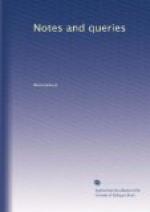“E il lere del dificio m’
ha giurato,
Quand’ egli ha visto le Poesie ch’
i’ ho fatte,
Ch’ elle son belle, e i piedi in
terra batte,
E vuol ch’ io mi sia in Pisa adottorato.
“Io canto, quand’ io son ben
ben satollo,
Sul Chitarrin con voce si sottile,
Ch’io ne disgrado insien Maestro
Apollo.
“Vien un poco da me, Tina gentile,
Che s’ egli avvien che tu mi segga
in collo,
M’ sentirai ben tosto alzar lo stile.”
Antonio Malatesti was a man of mark in his time, being distinguished for his talent as an improvisatore. Among his friends were Galileo, Coltellini, and Valerio Chimentelli, who have all commendatory poems prefixed to Malatesti’s “Sphinx,” a collection of poetical enigmas, which has been frequently reprinted. Beside his poetical talent, he studied astronomy, probably under Galileo; and painting, in which he was a pupil of Lorenzo Lippi, author of the “Malmantile Raqquistato,” who thus designates him under his academical name of Amostante Latoni (canto i. stanza 61.):—
“E General di tutta questa Mandra
Amostante Laton Poeta insigne.
Canta improviso, come un Calandra:
Stampa gli Enigmi, ’Strologia, e
Dipigne.”
Malatesti was a member of the Academy degli Apatisti, of which Milton’s friends Coltellini and Carlo Dati had been the principal founders. The house of the latter was a court of the Muses, and it was at the evening parties there that all who were distinguished for science or literature assembled: “Era in Firenze la sua Casa la Magione de’ Letterati, particolarmente Oltramontani, da lui ricevuti in essa, e trattati con ogni sorta di gentilezza."[1] Heinsius, Menage, Chapelain, and other distinguished foreigners were members of this academy; and it is more than probable that, were its annals consulted, our poet’s name would also be found there.
S.W. Singer.
Mickleham, July 15, 1850.
[Footnote 1: Salvino Salvini Fasti Consolari dell’ Academia Fiorentina, 1717, p. 548. Milton’s stay of two months at Florence must have been to him a period of pure enjoyment, and seems to have been always remembered with delight:—“Illa in urbe, quam prae ceteris propter elegantiam cum linguae tum ingeniorum semper colui, ad duos circiter menses substiti; illie multorum et nobilium sane et doctorum hominum familiaritatem statim contraxi; quorum etiam privatas academias (qui mos illie cum ad literas humaniores assidue frequentavi). Tui enim Jacobe Gaddi, Carole Dati, Frescobalde, Cultelline, Bonmatthaei, Chimentille Francine, aliorumque plurium memoriam apud me semper gratam atque jucundam, nulla dies delebit.”—Defensio Secunda, p. 96., ed. 1698.]
* * * * *
Pulteney’s ballad of “The honest jury.”
On the application for a new trial, in the case of The King against William Davies Shipley, Dean of St. Asaph (1784), wherein was raised the important and interesting question, whether in libel cases the jury were judges of the law as well as the fact, Lord Mansfield, in giving judgment, remarked in reference to trials for libel, before Lord Raymond:




